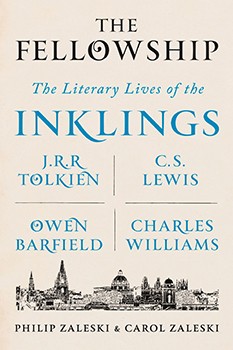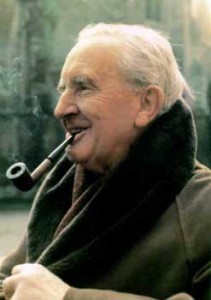Band of brothers: the Inklings at Oxford
Tuesday, August 18th, 2015
Where the parties happened. (Photo: Wikipedia)
Everywhere I go, I seem to find something about the new book, The Fellowship: The Literary Lives of the Inklings: J. R. R. Tolkien, C. S. Lewis, Owen Barfield, Charles Williams by Carol and Philip Zaleski (and published by Farrar, Straus & Giroux, no less). Now I see the story in The Atlantic, too, in an article (here) by James Parker.
I’ve always loved the Inklings, not only for their writing, but also because they represent a period in England that I love:
 In this nearly magical room, amid fire-crackle and clink of glass, you can hear them talking. Pipe smoke is in the air, and a certain boisterous chauvinism, and the wet-dog smell of recently rained-on tweed. You can hear the donnish mumbles of J. R. R. Tolkien as the slow coils of The Silmarillion glint and shift in his back-brain. Now he’s reading aloud from an interminable marmalade-stained manuscript, and his fellow academic Hugo Dyson, prone on the couch, is heckling him: “Oh God, not another fucking elf!” You can hear the challenging train-conductor baritone of C. S. Lewis, familiar to millions from his wartime radio broadcasts; hear the unstoppable spiel of the writer/hierophant Charles Williams, with his twitchy limbs and angel-monkey face; hear the silver stream of ideas and argumentation that is the philosopher Owen Barfield. They are intellectually bent upon one another, these men, but flesh-and-blood is the thing: conviviality is, for them, a kind of passion. The chairs are deep; the fire glows gold and extra fiery in the grate. Lewis’s brother, Warnie, rosy with booze and fellow feeling, serves the drinks. And the walls drop away, and the scene extends itself backwards and forward in time …
In this nearly magical room, amid fire-crackle and clink of glass, you can hear them talking. Pipe smoke is in the air, and a certain boisterous chauvinism, and the wet-dog smell of recently rained-on tweed. You can hear the donnish mumbles of J. R. R. Tolkien as the slow coils of The Silmarillion glint and shift in his back-brain. Now he’s reading aloud from an interminable marmalade-stained manuscript, and his fellow academic Hugo Dyson, prone on the couch, is heckling him: “Oh God, not another fucking elf!” You can hear the challenging train-conductor baritone of C. S. Lewis, familiar to millions from his wartime radio broadcasts; hear the unstoppable spiel of the writer/hierophant Charles Williams, with his twitchy limbs and angel-monkey face; hear the silver stream of ideas and argumentation that is the philosopher Owen Barfield. They are intellectually bent upon one another, these men, but flesh-and-blood is the thing: conviviality is, for them, a kind of passion. The chairs are deep; the fire glows gold and extra fiery in the grate. Lewis’s brother, Warnie, rosy with booze and fellow feeling, serves the drinks. And the walls drop away, and the scene extends itself backwards and forward in time …
Is it the famous Eagle & Child, my favorite Oxford pub with its cramped dark-wood interiors and nooks and crannies? No! It’s Lewis’s rooms at Magdalen College, Oxford – I have to admit, it is perhaps the most beautiful college at the University (although I’m also partial to Christ Church, W.H. Auden‘s college, since I stayed across the street from it and got to look out over its marvelous gardens leading down to the ducks and the boats on Cherwell).
More from the review:
And so it began, and so it went on, with additions and diminutions, until the late ’40s. Reading aloud and commenting upon unfinished work was the group’s primary activity. Lewis’s The Great Divorce, Williams’s All Hallows’ Eve, and—most resonantly for us—Tolkien’s The Lord of the Rings all made their debut in this context. Tolkien, like Lewis, was part of the fabric of Oxford University, a philologist and a professor of Anglo-Saxon, teaching Beowulf by day while tinkering at night, at home, with his own made-up languages. Tinkering is of course quite the wrong word: Tolkien was plunging, spelunking, delving, excavating, as pickax-happy as a dwarf in the Mines of Moria, because in the roots of language—the glowing word-cores, the namings—he had found the roots of story. “For perfect construction of an art-language,” he explained in a talk delivered in 1931, “it is found necessary to construct at least in outline a mythology.” And there it is: the DNA of The Lord of the Rings. It was at this level of thinking that Tolkien met the way-ahead-of-the-curve Barfield, for whom language contained “the inner, living history of man’s soul.” Barfield’s brilliant 1926 book, History in English Words, is a work of philosophical archaeology, tracking and illuminating, via the changing meanings of words, the development of Western mental reality. And for Barfield, all reality was mental reality. “When we study long-term changes in consciousness,” he stated unequivocally, “we are studying changes in the world itself … Consciousness is not a tiny bit of the world stuck on the rest of it. It is the inside of the whole world.” (In Barfield’s old age, his theories would gain him a notable acolyte in Saul Bellow.)
Well, as mentioned, read the whole thing here. And read my Polish friend Artur Sebastian Rosman’s interview with the Zaleskis here.

Ducks and boats on the Cherwell. (Photo: Humble Moi)









